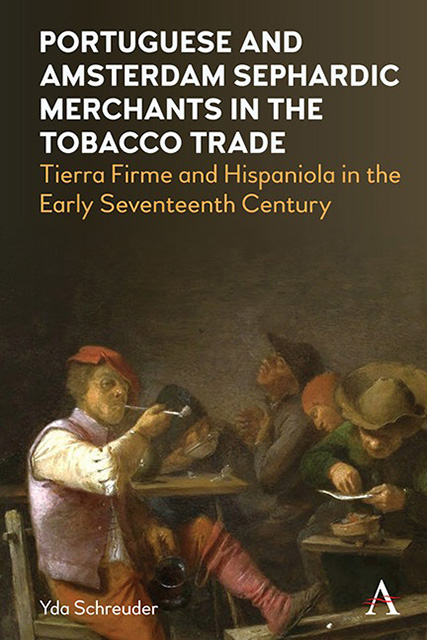 Portuguese and Amsterdam Sephardic Merchants in the Tobacco Trade
Portuguese and Amsterdam Sephardic Merchants in the Tobacco Trade Book contents
- Frontmatter
- Contents
- List of Figures
- Preface
- Chapter 1 Portuguese and Amsterdam Sephardic Merchants in The Tobacco Trade in The Early Seventeenth Century
- Chapter 2 The Contraband Tobacco Trade With Spanish America: Tierra Firme and Hispaniola
- Chapter 3 Portuguese Merchants and The Tobacco Trade With Tierra Firme
- Chapter 4 Portuguese Merchants and The Tobacco Trade With Hispaniola
- Chapter 5 Conclusion
- Bibliographic Notes
- Index
Chapter 4 - Portuguese Merchants and The Tobacco Trade With Hispaniola
Published online by Cambridge University Press: 17 October 2023
- Frontmatter
- Contents
- List of Figures
- Preface
- Chapter 1 Portuguese and Amsterdam Sephardic Merchants in The Tobacco Trade in The Early Seventeenth Century
- Chapter 2 The Contraband Tobacco Trade With Spanish America: Tierra Firme and Hispaniola
- Chapter 3 Portuguese Merchants and The Tobacco Trade With Tierra Firme
- Chapter 4 Portuguese Merchants and The Tobacco Trade With Hispaniola
- Chapter 5 Conclusion
- Bibliographic Notes
- Index
Summary
Political, Economic, and Geographical Context
In A Nation Upon the Ocean Sea, Studnicki-Gizbert (2007) shows us repeated evidence of the role Portuguese New Christian merchants and their foreign partners played in smuggling activities and in bribing officials. As members of the Portuguese Nation they promoted and conducted “free trade” and brought the wrought upon them by cultivating an elaborate system of working within the system and accumulating and circulating wealth outside the realm. Operating within and outside the Spanish system they extended partnerships with merchants in Northern Europe and the Mediterranean region and with the various merchant communities in the Spanish American colonies. In the 1620s, prominent members of the Portuguese Nation formed a key group in the efforts to install Count-Duke of Olivares as Prime Minister under King Philip IV of Spain who promoted the imperial commonwealth of Spain and Portugal. Within the realm the Canary islands and Hispaniola were integral parts of the inter-locking system of trade which merchants of the Portuguese Nation promoted and served. The islands were points of contact where cargo was transferred and where foreign merchants engaged in contraband trade thrived.
In a World on the Move, Russell-Wood (1992) reminds us of the connections, interactions, and movement of goods and people in the early modern Atlantic world. Perhaps more than any place Hispaniola exemplified that characterization and Portuguese merchants were the most prominent examples. Commercial success depended on regular and sustained personal contact and circulation of goods via the transatlantic networks of merchants and mariners which provided a steady stream of information about supply of products, market prices, routes to sail, and people to stay in contact with. The breadth of such merchant networks expanded significantly in the late sixteenth and early seventeenth centuries as Spain’s imperial reach widened and engaged Portuguese merchants and bankers after the unification of 1580. However, the role of Portuguese merchants in the Atlantic trade had been evident for some time before the unification as evidence from the slave trade and sugar trade demonstrates. Furthermore, slaving and smuggling often went hand in hand and Portuguese merchants were omnipresent where slaves were in demand, plantations emerged, and export of staple goods became the life blood of the colonial administration.
- Type
- Chapter
- Information
- Portuguese and Amsterdam Sephardic Merchants in the Tobacco TradeTierra Firme and Hispaniola in the Early Seventeenth Century, pp. 99 - 126Publisher: Anthem PressPrint publication year: 2023


